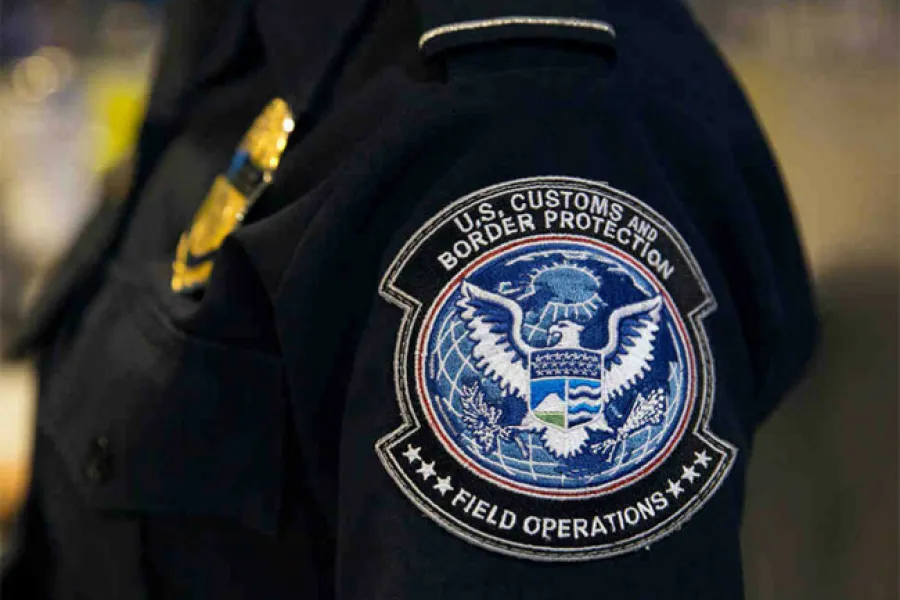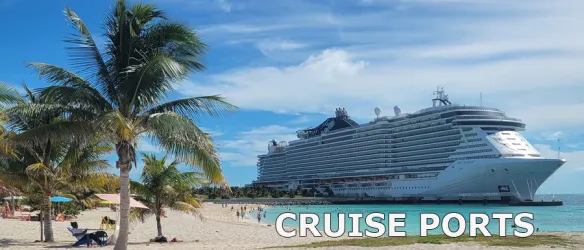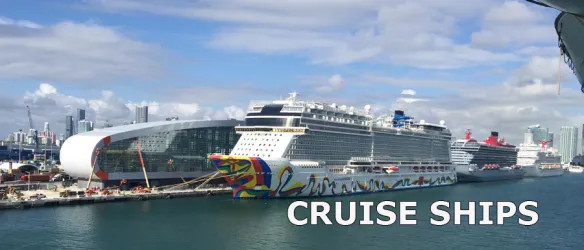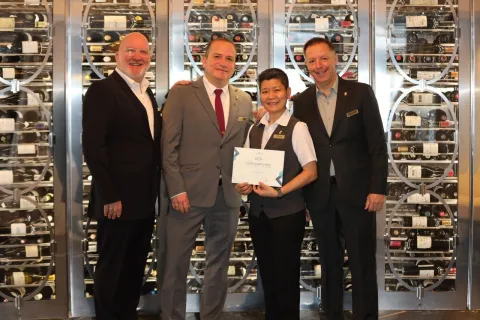
Crew Center received a large number of emails from crew members related to the Customs and Border Protection (CBP) restrictions that brought about uproar by the crew in several US ports in October 2019. The concerns related to the restriction came in especially from crew members aboard cruise ships that only dock in US ports. As one of the crew members at the time mentioned that this is her first contract and for the next 6 months if the restriction stands she will be a "prisoner on the ship" since the ship is sailing from San Diego to Hawaii. The initial restriction in October reportedly provided guidelines that a crew member has to have 5 contracts in order to be able to gain port entry in New York and New Jersey. CBP reportedly revoked the restriction on November 1, 2019, and returned the standard rule of case-by-case basis determination of entry to port. Last week Cruise Industry News released an official statement from the CBP informing that "Currently, there are no U.S. Customs and Border Protection restriction at seaports across the U.S...All shore leave permissions or restrictions at Ports of Entry are determined on a case-by-case basis." With the US CBP lifting the restriction, Crew Center was under the impression that the emails from crew members will cease as the ability to utilize their US issued C1-D visas and I-95 landing permit without contract-based restrictions was lifted. However, this was not the case as the emails poured from crew members based on the Spirit of Discovery prior to porting in New York on December 27, 2019, before sailing cross-Atlantic to Europe with 10 effective sea days and only one port of call in Bermuda.
Crew members reported that without much prior notice on the crew announcement board was posted the following: "as per Regulation in New York, all crew 1st and 2nd-time contract with the company are denied shore leave." With the CBP publicly making a statement that there are no restrictions based on contracts and entry will be determined on a case-by-case basis, the question at the time was per which Regulation is that restriction posed onto the crew members? The "Regulation" in question was not referenced, specified, or implied within the vagueness of the presented announcement for crew members to refer to. If the "Regulation" was imposed by the cruise company based on their own policies, crew members as contractors aboard ships do have the right to access the rules, regulations, bylaws, and have knowledge of the same within the scope of their signed contract. However, the same implies if the restriction was posed by the CBP as the entity is also guided by laws that provide freedom of information.
One of the crew members reported that "the captain just made an announcement stating that no crew allowed ashore, unless they have served 2 full contracts with Saga Cruises (irrespective of other contracts on different ships) or you are 3stripes above. Frustrating that even with a C1-D and an I-95 we are effectively hostages."
Another crew member wrote "Captain announced today that crew members are not allowed to go ashore in New York where our ship Spirit of Discovery will be docked for 2 full days. The exception is for crew with more than 2 contracts and officers with 3 stripes. We believe that it's a decision from the company but it's blaming the immigration authorities. We have so many new crew members and nobody wants to be responsible in case they desert."
And even though this is not the last email from crew members of the Spirit of Discovery it is one that poses the most questions:
- "We (Spirit of Discovery) docked at 1pm local time, at which point the captain made an announcement saying that "they managed to secure passages ashore*" for the following nationalities.
- - Netherlands
- - Japan
- - Spain
- - Portugal
- - Poland
- - Hungary
- - The United Kingdom
- To me this further reinforces the fact that the company is refusing to let people go ashore, not the CBP."
Upon the release of the initial piece by Crew Center as related to the concerns and complaints by crew members suspecting that the cruise line is responsible for the decision related to the restriction (which at this time Crew Center cannot confirm or deny whether the restrictions were posed by the cruise line or CBP with the captain simply reinforcing the restriction) reportedly the captain made an announcement the night before docking in New York clarifying that the restriction was posed by CBP as per crew member who provided update on the matter. Furthermore, per same source email was disbursed by the captain further clarifying that the company did not pose the restriction, but merely reinforced based on Port Authorities guidance.
Whether the restriction was posed by one or another party one thing is for sure, the crew members are human beings who need and have a right to freedom of movement especially if they are about to be sea locked for extended period of time and being able to feel solid ground underneath their feet. Stocking up on much needed items prior to being sea locked for an extended period of time, as we all know that the crew stores do not always have all of the items we need. With the short notice provided, any adjustments and considerations to some of those basic needs to the crew member should be emphasized as short notice does not give much if any time to adjust in preparation for such major cross Atlantic transition for the crew.
Furthermore, the largest percentage of crew member population within the cruise industry based on nationalities renders the Filipinos, India, Eastern European countries, etc. The above presented list sent by a crew member gives a perspective on concerns related to risks as related to potential for abandoning ship as the nationalities listed are not developing countries as the ones of the largest percentage of crew members within the cruise industry.
Although the CBP has the ability to determine port of entry on case-by-case basis and the captain has the responsibility to reinforce the same as related to his or her crew members as the responsible party, the question lies as what constitutes a “case-by-case” basis? Is it person to person, ship to ship, nationality to nationality, etc.? If we take in consideration the above mentioned list may give notion to crew, members, that in this case it is determined based on nationality and with consideration of the “2 contracts with the company” rule, based also on some loyalty and history of maintaining employment with the cruise line.
If the restriction was posed by CBP and the large percentage of nationality-based crew members are not allowed port of entry, what is the ability of the cruise line, captain and even the crew members to appeal the decision if not for the current situation, but future references? Does the cruise ship have an immigration liaison or access to electronic means to appeal a certain decision especially if it affects large percentage of the crew? We presently do not have answers to these questions, but hope that crew members ask these in order to have an understanding of what are the actions they are able and responsible to take for future references.
As a past crew member and representative of the apparently “not so popular” nationality on the above mentioned list I — as well as other past and present crew members who did their contracts and did not violate immigration laws or regulations — are at uproar for the label of flight risk based on nationality alone regardless of which entity posed the restriction. The uproar is related to overt discrimination based on nationality and negative correlation with flight risk as yes those are developing countries, however, in those countries are still the families for which most of those crew members do sacrifice their time away from them for an extended period of time to work hard and provide for the same without the major cost affiliated to living on land especially country as expensive as the US and not to mention the cost of living in New York and New Jersey (with highest cost of living in the US alongside to LA and Seattle).
Yes, some crew members in the past have fled cruise ships and CBP, as well as the cruise line, does bare responsibility when that occurs. However, basing the actions of others in the past onto the current crew members as related to nationalities is nothing short than a logical fallacy based on the perception of Hasty Generalization and Straw Man Fallacy at least. Case-by-case risk assessments for individuals are completed when applying for any visa by being asked questions such as “do you have any relatives in the States,” “have you ever committed a crime,” etc., as well as completion of background checks. Of course, these risks assessments will need to be periodically updated on need basis, when something changes in the status, or when reapplying for a visa. However, those are individualized risks assessments which generally provide option and means to appeal the decision when or if denied.
I still remember sitting in the US embassy when this one elder lady who was applying for visitor visa to see her daughter who just had a baby being denied on the basis that her daughter overstayed her visa and married which gained her permanent ability to stay and since her daughter was raised by her the risk is to high that she will not return to her homeland. Nonetheless, the lady was provided means and ability to appeal the process and decision based on additional information. This example is solely to show that risks assessments on individual basis are completed before entry to the States, but also on individual case-by-case basis, as well as even as a foreign citizen having a right to appeal a decision.
When considering the amount of contracts crew members have completed with the company, what about the crew members who have done several contracts with another company and have a clean history of following immigration laws and regulations? For a crew member to reach up to third contract -- which contracts on average are anywhere between 6-8 months -- the understanding is not that only the crew member has to show their loyalties towards the company, but the company towards the crew members as well. Once upon my crew lifetime ago, the options between cruise companies were CCL, RCCL, NCL, and maybe a few more. Thus the saying of "I can replace you in few seconds" was definitely a fact. Crew members have limited choices for finding employment within the cruise industry. However, today the cruise industry has expanded exponentially that crew members do have the power to choose their current or future employer. Especially crew members who have experience and have performed well within the realm of the ship culture and world as let's be real, living and working on a ship is not for the faint-hearted and definitely not for the want to sleep in until noon people. It is those crew members that generally leave an employer out of principle even if it means a pay cut as the notion of being appreciated, acknowledged and respected for their work is imperative. However, when people work and live within their employment environment another crucial principle is whether the employee can trust the employer to assure their basic human rights and needs. And as the emails poured the past week, this did not appear to be the case at the time for the Spirit of Discovery. Nonetheless, with the response from the Captain who is apparently trying to maintain the loyalty from its crew and do problem mitigation through providing some level of transparency one may pose the consideration of moving away from the problem and towards a solution in answering some of the above mentioned questions and advocate as a whole through proper channels whether it be the Captain, cruise line or CBP, as well as other means of advocacy resources.
Here are some words of advice from past crew members:
Crew members do need to be mindful when signing contracts and keeping copies of the same for their own records as contractors. Furthermore, at ship entry obtaining a copy in some shape or form of the rules, regulations, and policies of the ship that guide the living, working, functioning, and rights of the crew members is imperative in order to be able to reference any regulations or policies. When a regulation is being presented for any purpose such as reprimand, suspension, restriction, etc. request either a copy of the regulation or to be referred to which one it is from the crew member employee handbook. Yes, you work a lot of hours and do not have time to read all of those tedious words on a paper, but having knowledge to advocate for your own rights protection and healthy working/living environment with emphasis on basic human rights does bare some of your responsibility to become knowledgeable. Changes in policies are not only for CEOs and supervisors, but crew members as well as they impact them. Companies have the right to change policies, but also have responsibility to convey the same to its employees before incorporating them as it does affect them firsthand. Aboard cruise ships, the captain is to a point "the law" and can make appropriate changes related to safety and much more, but unless it is safety or imposed by another governmental entity any changes the captain makes have to be with taking consideration and respect to the rights of the crew members with respect and consideration free of discrimination based on gender, nationality, race, sex, etc. Focus on solutions and ways to implement the same versus problems and blame, but most importantly as the old saying goes “knowledge is power” take it as wisdom that withstands the test of time.
Disclaimer: Crew Center is not making a claim of responsibility towards either parties, but providing insight, information, advocacy and support for all crew members as one of the primary mission of the website.
Crew Insights
Articles and experiences shared by crew members working on cruise ship. Find out more about ship life at sea together with tips and advices for first time crew members and cruise oldtimers.












